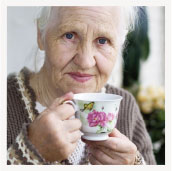Caregiver stories: James Patterson and his wife

At first, she only needed help with more significant daily activities, but then over the years it became difficult for her to eat. Eventually, she needed more and more basic assistance and required a wheelchair. My wife and I have always been there for each other through 50 odd years of marriage, and this meant taking care of each other too. But, once she became ill, the balance just seemed to shift from being 50-50 to 60-40 to 70-30, and so on. Now I take care of all that I need to do plus what she needs done. It’s a very long process, becoming a caregiver, and you never realize you’ve begun until you have a chance to reflect. I have now been a caregiver for five years.
Being a caregiver is a big responsibility and it can be isolating. My wife and I used to be active in our community and enjoyed volunteering and social events. Now there’s too much to do and she can’t get out, so we stay at home-that’s a big change.
I think men, in particular, tend to think they can handle everything themselves and are not as comfortable asking for help. That’s a mistake – it’s important to get help when you need it and have support structures in place. Every day, I help my wife get in her wheelchair, dress and bath her, prepare meals and help her to eat, and administer her medication. I also maintain and clean the house, as well as run errands.
It’s also important to take some time for yourself when and if you can. Two or three times a week, I have a caregiving helper come and stay with my wife for a few hours and by the time these days come around, I really need it. These breaks are extremely important because I can get chores or errands done or go play a game of golf. As a caregiver, you can never really get away-you’re always there. But, if you can find time for something else and get away from your daily routine even for a short while, it can be very rejuvenating. A struggle I deal with as a caregiver is that you don’t always get a thank you for your hard work because it becomes expected and part of the routine, which can sometimes make you frustrated or angry. However, my actions are just part of our way of our life, so “thank you’s” aren’t needed or expected anymore, and when one comes along, it’s a real big deal.
The resources for caregivers that are available via Ask Medicare and the National Institute on Aging are invaluable. They cover everything from bathing to hygiene to incontinence. I’m learning something new every day. I can show the materials available to my wife and we can read them together so she can help me help her.
It makes me feel good to know that I can take care of my wife and maintain the home we’ve built together. We don’t have to uproot ourselves and can maintain our present position and that is a daily reward. Caregiving is a learning process and, after five years, my wife and I have come a long way.
The best advice I would give to new caregivers is to be patient and be in it for the long haul. Get as much information as possible and know that people are there to support you. You and your loved one are in it together, so just take it one day at a time. And remember, love takes many forms and whenever you help each other, that form of love binds you closer than you can imagine.
See original story here.





